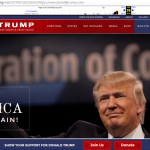 Recently, I appeared on the Up for Debate radio program hosted by Julie Roys to debate the status of the Johnson Amendment. The Johnson Amendment forbids non-profit organizations from electioneering. Some religious groups want to repeal the amendment in order to allow pastors to endorse candidates for office without putting church tax exempt status at risk. Erik Stanley of Alliance Defending Freedom argued for the repeal of the amendment.
Recently, I appeared on the Up for Debate radio program hosted by Julie Roys to debate the status of the Johnson Amendment. The Johnson Amendment forbids non-profit organizations from electioneering. Some religious groups want to repeal the amendment in order to allow pastors to endorse candidates for office without putting church tax exempt status at risk. Erik Stanley of Alliance Defending Freedom argued for the repeal of the amendment.
While discussing the matter, I volunteered that I have no problem with pastors expressing their views about political candidates but I do have a problem with tax exempt churches using tithes and offerings for political purposes. Those funds are exempt from taxation and as such should not be funneled into support for specific candidates. In short order, churches would become political action committees with donors getting a tax exemption for money eventually going to fund partisan politicking.
In response, Erik Stanley mentioned the Free Speech Fairness Act (HR 781/S264). Stanley characterized the bill as a fix for the Johnson Amendment, not a complete repeal. The text of the bill is as follows:
115th CONGRESS
1st Session
H. R. 781
To amend the Internal Revenue Code of 1986 to allow charitable organizations to make statements relating to political campaigns if
such statements are made in the ordinary course of carrying out its tax exempt purpose. _______________________________________________________________________
IN THE HOUSE OF REPRESENTATIVES
February 1, 2017
Mr. Scalise (for himself and Mr. Jody B. Hice of Georgia) introduced the following bill; which was referred to the Committee on Ways and Means
_______________________________________________________________________
A BILL
To amend the Internal Revenue Code of 1986 to allow charitable organizations to make statements relating to political campaigns if
such statements are made in the ordinary course of carrying out its tax exempt purpose.
Be it enacted by the Senate and House of Representatives of the United States of America in Congress assembled,
SECTION 1. SHORT TITLE.
This Act may be cited as the “Free Speech Fairness Act”.
SEC. 2. ALLOWING 501(C)(3) ORGANIZATION TO MAKE STATEMENTS RELATING TO POLITICAL CAMPAIGN IN ORDINARY COURSE OF CARRYING OUT ITS TAX EXEMPT PURPOSE.
(a) In General.–Section 501 of the Internal Revenue Code of 1986 is amended by adding at the end the following new subsection:
“(s) Special Rule Relating to Political Campaign Statements of Organization Described in Subsection (c)(3).–
“(1) In general.–For purposes of subsection (c)(3) and sections 170(c)(2), 2055, 2106, 2522, and 4955, an organization
shall not fail to be treated as organized and operated exclusively for a purpose described in subsection (c)(3), nor
shall it be deemed to have participated in, or intervened in any political campaign on behalf of (or in opposition to) any
candidate for public office, solely because of the content of any statement which–
“(A) is made in the ordinary course of the organization’s regular and customary activities in carrying out its exempt purpose, and
“(B) results in the organization incurring not more than de minimis incremental expenses.”.
(b) Effective Date.–The amendments made by this section shall apply to taxable years ending after the date of the enactment of this
Act.
So if the speech is made in the course of carrying out tax exempt purposes and results in insignificant costs, the speech would be permitted. Given the restriction on spending, this is not a repeal but a fix.
But is it an adequate fix? I argue that it is not. I don’t think any loophole for churches to spend tithes on political purposes, even de minimis, should be allowed. What is de minimis to one church might not be considered de minimis to another. Furthermore, the point of fixing the free speech problem should be on speech, not money. In kind contributions should also be forbidden. As this is written, I don’t support it.
One of the co-sponsors is Jody Hice a Christian from Georgia who sounds dominionist tones. He talked about the “repeal” of the Johnson Amendment at a recent David Barton sponsored meeting.
[youtube]https://www.youtube.com/watch?v=kIFDGe14M7E[/youtube]
As I have noted before, most pastors don’t want to endorse candidates from the pulpit which is as it should be in my opinion.
